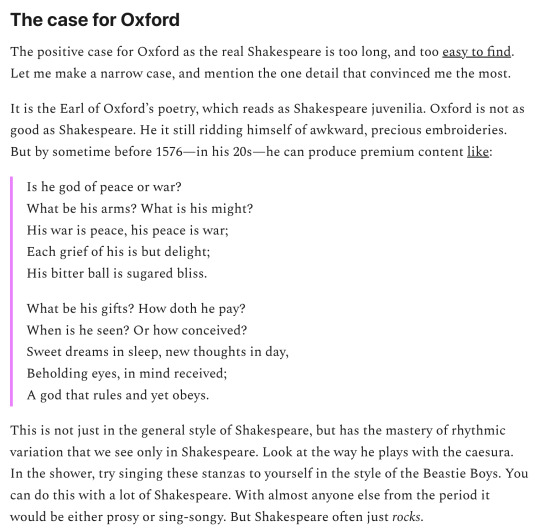#Curtis Yarvin
Note
The thing about TLP is that, at a certain point, you could see he was mostly repackaging Lacanian insights (such as they are) for the internet aughts (and, as you say, the nascent post-left who might not at that point have read Lasch yet since he was long out of fashion on the left). But re: psychoanalytic roots, TLP’s writing had that same intellectual elation/depressive realization arc that I think is summed up by the term “insight porn.” It’s not surprising, really, that he wrote so much about porn itself, because there’s something mimetic going on there. And Moldbug stylistically is/was not much different, in the smarmy, hectoring, just-so story type of way. The Victorians I believe called it “sage writing,” and Moldbug was always explicit about Carlyle as a model. I await the scholar who will connect these dots between insight porn/sage writing, because it’s what the internet (at least its blogging aspect) was made for and what it shapes and bends all the light toward.
Yes, good observation. I almost go out of my way to avoid writing insight porn for the reasons you describe. It's not that I don't have theories of everything, it's that I think all the theories of everything have their uses and their elements of truth, but the capital-T Truth, probably unavailable to us, is comprised of all these theories together, and raw experience besides. (I will even grant Moldbug a productive contribution: he seems to have explained to the right in a way that stuck why anti-Semitism is wrong, i.e., why blame Jewish people for what are obviously the consequences of the Protestant Reformation?) It's why I only write fiction and criticism: fiction binds you to the story and characters, criticism to the text under commentary. These grounding specificities prevent over-abstraction. The Victorian sages are an interesting connection: they too denounced liberal modernity and had their preferred quick-fixes. But they also had prophetic powers of language the 21st-century blogger can't equal. I need to read them more systematically someday; I've mostly just sampled. For sheer prose I prefer Ruskin to Carlyle, while idea-wise I think Matthew Arnold is too quickly dismissed nowadays.
8 notes
·
View notes
Text

#nick land#mencius moldbug#curtis yarvin#neoreactionary#bitcoin#twitter#crypto#elon musk#accelerationism
2 notes
·
View notes
Text
It's nuts that when the 2010s were over and done, Mencius Moldbug was one of the figures to come out relevant going forward
27 notes
·
View notes
Link
7 notes
·
View notes
Photo







Doodles as I watched a Curtis Yarvin discussion.
4 notes
·
View notes
Photo




(link)
3 notes
·
View notes
Text

In Zeiten »anarchokapitalistischer« Staatsoberhäupter, aufstrebender US-Nachwuchspolitiker mit betont illiberalen Ansichten (etwa J.D. Vance, Blake Masters oder Vivek Ramaswamy) und dem Wirken nicht nur wirtschaftlich, sondern auch kulturell und politisch disruptiver Tech-Milliardeninvestoren wie Elon Musk und Peter Thiel kommt oft die Rede von einem neuen Feudalismus oder gar einer »Neoreaktion« (NRx) auf. Was genau soll das sein?
Alles geht zurück auf einen hochbegabten, aber arbeitslosen Informatiker namens Curtis Yarvin (alias Mencius Moldbug) und den antihumanistischen Philosophen des »Akzelerationismus«, Nick Land. Mit meiner kleinen ideengeschichtlichen Analyse kann der deutschsprachige Leser nachvollziehen, wie Yarvin ab 2007 um seine persönliche Auslegung der europäischen Geistesgeschichte eine »Cloud« hochintelligenter Autoren und Denker voller Skepsis gegenüber Demokratie und Liberalismus scharte, und wie der ehemalige Philosophiedozent Land fünf Jahre später darüber den Horizont einer »Dunklen Aufklärung« aufspannte. Ich präsentiere die wichtigsten Figuren der digitalen Reactosphere, erläutere die zentralen Begriffe von Cathedral bis Bioleninism, stelle NRx in den Kontext der intellektuellen US-Nachkriegsrechten und zeige, in welchen Phänomenen wir im Jetzt und Hier das Erbe von Dark Enlightenment und Neoreaction sehen können.
Wer herausfinden möchte, ob überall, wo »Reaktion« draufsteht, auch Reaktion drin ist, und ob das überhaupt erstrebenswert wäre, der sollte spätestens nach der Lektüre von »Neoreaktion und Dunkle Aufklärung« im Bilde sein.
#Moldbug#NRx#Neoreaction#Dark Enlightenment#Nick Land#Curtis Yarvin#Demokratie#Liberalismus#Cathedral#buchtipp#neuerscheinung#theorygram#Jungeuropa Verlag#elon musk#peter thiel#cathedral#accelerationism
1 note
·
View note
Text
Curtis Yarvin keeping it real:
As anyone who went to high school knows, intelligence is helpless against ignorance. Intelligence is not in any way a form of magic. It is just a way of finding patterns in the world.
I wonder is this is related to the apparent consensus in America for the past several decades of importing smart scientists instead of growing our own.
1 note
·
View note
Text


2 notes
·
View notes
Photo

Neoreactionary Curtis Yarvin makes an extended case for the Oxfordian answer to the Shakespeare authorship question. Or what passes for a case anyway. Mostly this great hater of democracy and populism just demagogues for his presumedly puerile audience, labeling Shakespeare—as in the actual Will from Stratford—a “rentboy” and an “illiterate Ghanian immigrant.” His clever idea is to set up the Stratford thesis as an anticipation of today’s diversity-and-equity critique of the canon.
Then he assails a straw man, the supposed Stratfordian belief that Shakespeare was a “democrat,” which nobody believes. Shakespeare fully expresses his view of “people power” in Julius Caesar’s popular sparagmos of Cinna the Poet. And if Julius Caesar held the early American stage and then became the staple American high school text, it was because the drama celebrates not democracy, which Shakespeare didn’t distinguish from resentful and fanatic mob violence, but republicanism in the tragic figure of Brutus.
As for Shakespeare’s overall politics, well, it’s always hard to say with a dramatist, who stages conflicts rather than enumerating theses, and this chameleon poet makes it harder than most. Yarvin quotes every reactionary’s favorite passage, Ulysses’s hymn to degree from Troilus and Cressida, but this is the utterance of a single dramatic character. Rosenkrantz—a sycophantic idiot—argues the same case in Hamlet while kissing Claudius’s ring. By contrast, that play’s hero pronounces what I suspect to be closer to the poet’s own political credo: “The king is a thing of nothing.”
In my reading, Shakespeare is a political nihilist, placing his faith in no institution and no ambitious men. He’s lyrical, where he is lyrical, only about love and private life and nature: precisely the quasi-anarchist (not democratic) anti-politics I find throughout modernity in writers who hail from the lower middle class—Yarvin, like a Marxoid polemicist, abuses the bard with this label too—from Keats to Dickens to Joyce (see my essay on Les Murray for a longer explanation).
But the strongest argument against Oxford’s claim is literary. Does de Vere’s da-dum da-dum doggerel really “rock” like Shakespeare? I count only one potential metrical inversion: in the first foot of the first line, “is” may be stressed for interrogatory emphasis, mainly because the line is short a syllable. But even if you read all the interrogatives as stressed, which you don’t have to, that’s hardly a poetically surprising reversal. Otherwise, the thing tick-tocks robotically like a metronome. Similarly, “the way he plays with the caesura”—what way? The caesura is precisely where we’d expect it to be in each line, not least because Oxford punctuates six of the 10 lines right in the middle, between two balanced sets of iambic feet. I can only conclude that Yarvin relies on an audience ignorant of his subject.
Ulysses’s speech, by contrast, is in Shakespeare’s general style, or at least his mature style, gnarled and enjambed, bristling less with neat Metaphysical paradoxes than with a careering rush of concrete and mingled tropes. Here is play with the caesura, sound mimicking sense: “And, hark, what discord follows! each thing meets...” Likewise, I recall that Frank Kermode thought hendiadys the Shakespearean rhetorical signature, sign of his copiousness and bounty: “Divert and crack, rend and deracinate / The unity and married calm of states.”
A more sophisticated reactionary would say that this apparently disordered and undisciplined style is just what we’d expect from a half-educated rube off the farm who could only read the classics in translation. But what do I know? I myself am just a scion of the anarchic lower middle class, while Yarvin, as he likes to remind us, is a descendant of that very oligarchic bureaucracy from which he promises, eventually, to deliver us.
#william shakespeare#curtis yarvin#edward de vere#literary criticism#neoreaction#poetry#english literature
14 notes
·
View notes
Text
.
#I was afraid that curtis yarvin would end up converting everyone who worked in the bay area/google#turns out i was wrong#and mike crumplar is exposing him for the shithead he is
0 notes
Text
Stumbled upon this rattish academic philosopher(?) with a substack complaining about how the "far left" are not willing to try and persuade ppl of their points of view on contentious topics like palestine and instead rely on purely emotional histrionics, citing as evidence that he spent 20min(!?) trying to confront random student protesters about their opposition to israel. Me fuming about this is maaaaybe a version of unproductive hunting for a guy online to get mad at but this is definitely a sentiment i have heard before, that the far left in particular is disinclined to argument and persuasion
My instinct every time someone says this shit is to ask, Have you ever flipped open a copy of jacobin? There are plenty of ppl on the "far left" willing to make this that or the other "case" for their pov if you actually seek out those arguments in the venues typical of lengthy political arguments. The domain of "arguments for why israel is bad and was a mistake" is famously about as richly inhabited as any on any topic. And if you want further left than jacobin (which has an editorial line that would absolutely still qualify as far left from this guys perspective), leninist pamphleteers and anarchist zine-writers are notoriously happy to provide. Some random university encampment foot soldiers arent likely going to be the ones doing that for the same reason the median participant at a hillary rally is not going to be the most eloquent apologist for centrist-wing democrats and an arbitrarily selected guy with a ron paul bumper sticker will not be particularly compelling when speaking on behalf of a return to the gold standard, theres nothing special about the student activists position on the political spectrum here other than thst ppl seem disproportionately likely to expect every "purple-haired androgynous man wearing a shirt that says [queers] for Palestine" to do the job of a professional editorialist for their faction while allowing for intellectual division of labour on others
If you talk to a Curtis Yarvin-type monarchist about the optimal government, they’ll argue about it for hours on end. Neoreactionaries were famous for writing absurdly long articles going back and forth with those who disagreed with them. Because they were fringe, because most people disagreed with them, they didn’t have the presumption that challenging them was gauche or indicative of moral failing. They were willing to get down dirty and argue.
No, man, mencius moldbug was "famous for writing absurdly long articles going back and forth with those who disagreed with" him. I remember the neoreactionary randos when that fad was still ongoing, and they spent most opportunities for debate instead being loudly self pitying. Which is not even really that much of a dig bc "highly articulate propagandist" will be an extreme minority in any political movt larger than a small friend circle of curious eccentrics, that is the whole point! You have to compare apples to apples, and instead of even looking for any you are deliberately hunting down the aisle for oranges and shaking yr head in disapproval
89 notes
·
View notes
Text
"Dimes Square" was a Thiel-funded attempt to make neoreaction hip with the youth. Every word out of it is the worst.
Honor Levy is the latest Dimes Square neoreactionary that The Cut did a puff piece on for unclear reasons. https://archive.is/SqSv5
Here's actual text from her actual fucking book. It's "Ready Player One" for race scientists. https://archive.is/WE3Nb

He was giving knight errant, organ-meat eater, Byronic hero, Haplogroup Rlb. She was giving damsel in distress, pill-popper pixie dream girl, Haplogroup K. He was in his fall of Rome era. She was serving sixth and final mass extinction event realness. His face was a marble statue. Her face was an anime waifu. They scrolled into each other. If they could have, they would have blushed, pink pixels on a screen. Monkey covering eyes emoji. Anime nosebleed GIF. Henlo frend. hiii.
The Cut piece just happens to mention how Levy interviewed Curtis Yarvin on her podcast
Brock Colyar at The Cut should know fucking better but shows no evidence of capacity for such
the NYT review: "There is an interesting sense here of young people brought up amid a war — a cultural one." you can tell this guy's been saving that line for a special occasion
filing Levy high on the list of Thiel's crimes
41 notes
·
View notes

